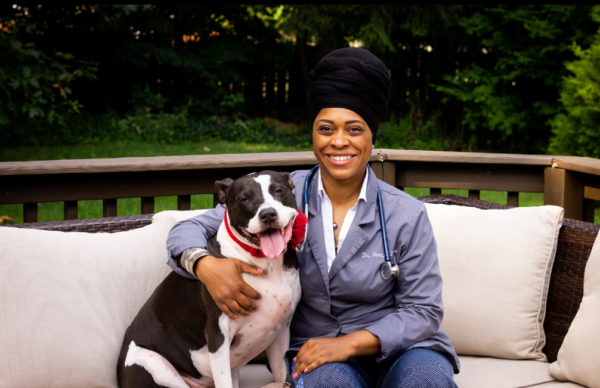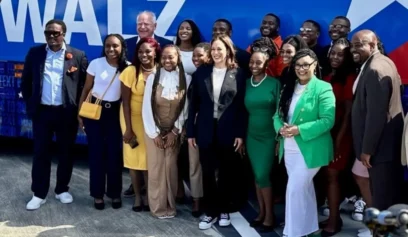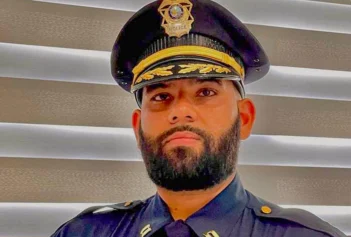Dr. Venaya Jones discovered her love for animals at a very young age, from the yapping lap dog to the slimy earthworms that seep from the soil after a heavy rain.
She’s since turned her fervor for four-legged friends — furry or otherwise — into a career, making history in Cleveland, Ohio, by opening up the first Black woman-owned veterinary hospital in the city.

Dr. Venya Jones made history this month by launching Cleveland’s first Black woman-owned veterinary clinic. (Photo courtesy of Venaya Jones)
Say hello to the new Cleveland Veterinary Clinic.
“I feel like it’s a great opportunity here in Cleveland, especially there being no other vet hospitals here,” Dr. Jones told local outlet News 5 at her grand opening earlier this month. “There are tons of people with pets, we’re in the health tech corridor. I mean, this is where quality medicine is discovered and done, and I want to be a part of that.”
The clinic, located in the city’s Fairfax neighborhood, offers a full range of vet services from basic wellness exams and internal medicine to surgeries and hospice care. The facility also offers vaccinations and dermatological care, among other services.
As the middle child, Jones said she would often look after the family’s pets and learned to lean on them for emotional support. From there, her love for animals grew and it was a veterinarian’s career day visit to her school that solidified her desire to be what she calls the “other family doctor.”
“Career day just put a name to the profession that I had already been dreaming about,” Jones, 44, told Atlanta Black Star in a recent interview. “I knew I wanted to fix animals, but I had no idea what it was called or that it was even a profession.”
The journey to opening her own practice has been far from easy, however. Like many Black business owners, Jones said finding the funding was one of her biggest obstacles.
“I went to several institutions and tried several different ways for getting my clinic,” she said. “Finally, one of them said yes, but it took a lot of asking before I was actually able to get the loan that I needed.”
Launching a clinic in what Dr. Jones described as a “veterinary desert” also proved challenging, as there were those who doubted her business would even survive. She was attempting something no one in the area had done before — but she didn’t let that deter her.
“Those were my two biggest obstacles; the finances and convincing people that I could open this clinic,” the Western University College of Veterinary Medicine graduate added.
Jones, who previously ran a veterinary house call business aptly titled The Other Family Doctor, credits the love and support of her family for helping get her new clinic up and running. The vet said her practice is dedicated to serving pet parents of all socioeconomic backgrounds and will continue making house calls for animals too sick to travel.
With one life-long dream under her belt, Jones said she not only wants to continue building her clientele but has made it her mission to boost the number of African-Americans in veterinary medicine by mentoring other women of color who might be interested in the career field.
“I want to make myself known in the community [and] available to other minorities that want to pursue the veterinary medicine field,” she told ABS. “I want to be known as the place to go if you’re seeking mentorship, [or] to get volunteer hours, or just want to know more about the veterinary profession.”
Blacks and other racial minorities have long been underrepresented in the field of veterinary medicine, which has been called “the whitest profession in America.” A 2016 report from the Association of American Veterinary Medical Colleges, African-Americans made up just 2.5 percent of students enrolled in colleges veterinary programs across the U.S.
In an effort to improve that figure, Tuskegee University, a historically Black institution, was awarded $7.1 million federal grant to help its School of Veterinary Medicine in “expanding its ability to recruit, train, and retain racially and ethnically underrepresented veterinary medical students.”
The funding also established a center of excellence in minority veterinary health education at Tuskegee via the U.S. Department of Health and Human Services’ Health Resources and Services Administration, as reported by the Journal of the American Veterinary Medical Association.
Through her clinic, Jones said she’s “hoping to uplift the community both physically and emotionally, health wise by taking care of their pets, but … also bringing a sense of pride and a sense of accomplishment. I want to be able to show other [young minorities] that they can do it, anything that they dream of, because here is a Black woman that’s come into this community and made it happen.”
So what’s she most grateful for?
“Just being granted this opportunity to live out my dream,” she said.


